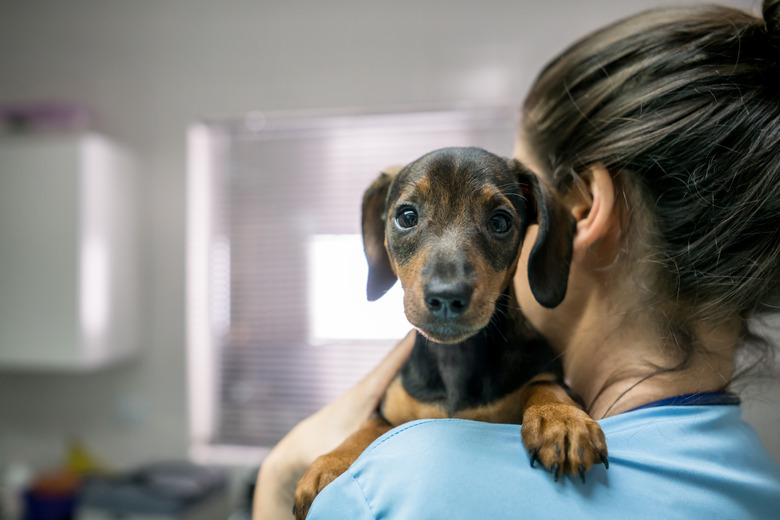Canine Levothyroxine Side Effects
Some dogs are born to be lazy, and they love every minute of it. For other dogs, however, frequent naps and a lack of motivation are signs of a problem. That problem may be an under-active thyroid gland, which is good news. If low thyroid hormone is the issue, you can have your dog bouncing around again in no time with levothyroxine, a drug that doesn't cause any nasty side effects.
Uses of levothyroxine for dogs
Uses of levothyroxine for dogs
Levothyroxine is a medication used to treat hypothyroidism in dogs, and it's the only canine hypothyroid medication approved by the U.S. Food & Drug Administration. Located in his neck, a dog's thyroid gland makes and releases hormones that control his metabolism. In hypothyroidism, the thyroid fails to produce enough hormones. This lack of hormones disrupts several body systems, causing a wide array of problems for the dog.
Any dog can experience hypothyroidism, but the condition occurs more frequently in large dog breeds than in small ones. Some medications can interfere with the thyroid gland. Though vets can't cure hypothyroidism, they can help you manage the condition for your dog. However, your dog will need to keep taking levothyroxine throughout her life.
Signs of hypothyroidism
Signs of hypothyroidism
It's important to know the signs of hypothyroidism even after your dog is diagnosed and begins treatment. Finding the proper dose of thyroid medication for a dog can require some tinkering. If your dog keeps showing signs of hypothyroidism while on medication, he may need a higher dose. The more you know, the better able you'll be to help your vet get the dosage just right.
Signs of hypothyroidism in dogs include:
- Lethargy and an increased need for sleep
- Thinning hair and bald spots, especially at the tail or around the neck
- Thick, dark skin developing in the armpits, groin, and other skin folds
- Skin infections
- A dull, dry coat
- Ear infections
- Weight gain
- Difficulty staying warm and seeking out areas near heaters and other heat sources
There are also internal signs of hypothyroidism that your vet can detect through blood tests. These include anemia and high cholesterol. Your vet will likely look for these clues when diagnosing your pet and when monitoring her once treatment begins.
Levothyroxine side effects
Levothyroxine side effects
Barring potential allergic reactions, there are no known dog thyroid medication side effects when the dosage is correct. If your dog suffers any side effects, he is likely taking too much medication and needs a dosage adjustment.
Levothyroxine side effects in canines that indicate an overdose include noticeable increases in appetite, thirst, and urination. Your dog may also overheat more easily than normal and could experience personality changes. Personality changes can be hard to define, but you know your dog better than anyone else, so trust your instincts. If you notice these side effects, contact your vet for guidance.
Dosage and administration
Dosage and administration
Levothyroxine for dogs is available in pills and chewable tablets. The proper dosage of this drug varies from one dog to another and could change for your dog over time. Usually, your vet will start by prescribing a dose of 0.1 milligrams per 10 pounds of body weight twice a day. He will then adjust your dog's dose as needed.
You may give levothyroxine to your dog with food or on an empty stomach — both are acceptable. Once you choose a method, however, you need to stick with it. Your vet may prescribe a higher dosage of medicine if your dog takes her pill with food. If she then takes a pill on an empty stomach, she could absorb the medication too quickly and overdose.
Ongoing monitoring matters
Ongoing monitoring matters
Your vet will want to monitor your dog frequently when he first starts taking thyroid medicine. He'll likely ask you to bring your dog back for blood testing every four to eight weeks. This may seem excessive, but it's necessary to make sure your dog is getting the perfect amount of levothyroxine. After your vet gets your dog's dosage dialed in, you should only need to have your dog's thyroid levels checked once or twice a year.
Always check with your veterinarian before changing your pet's diet, medication, or physical activity routines. This information is not a substitute for a vet's opinion.
